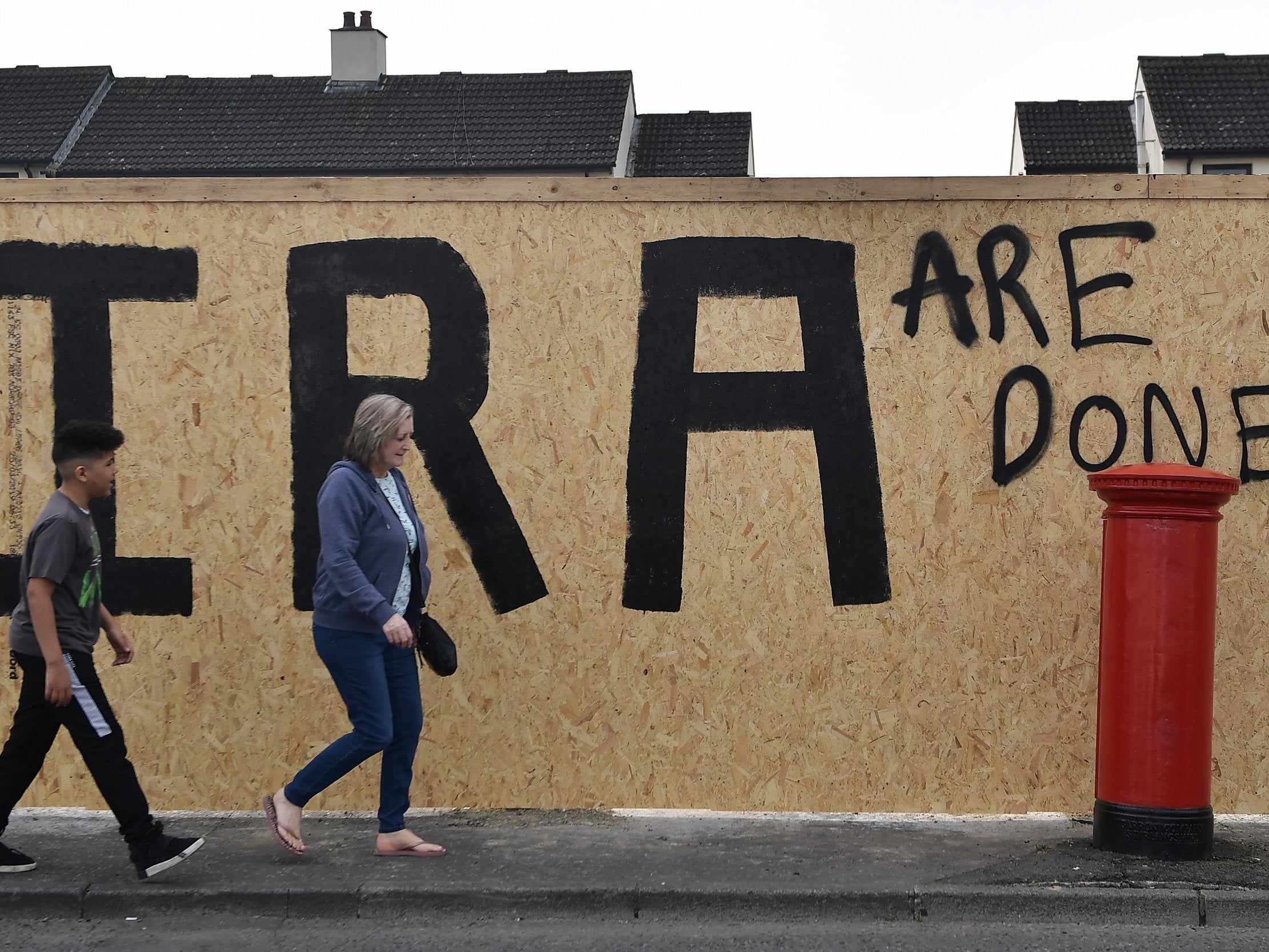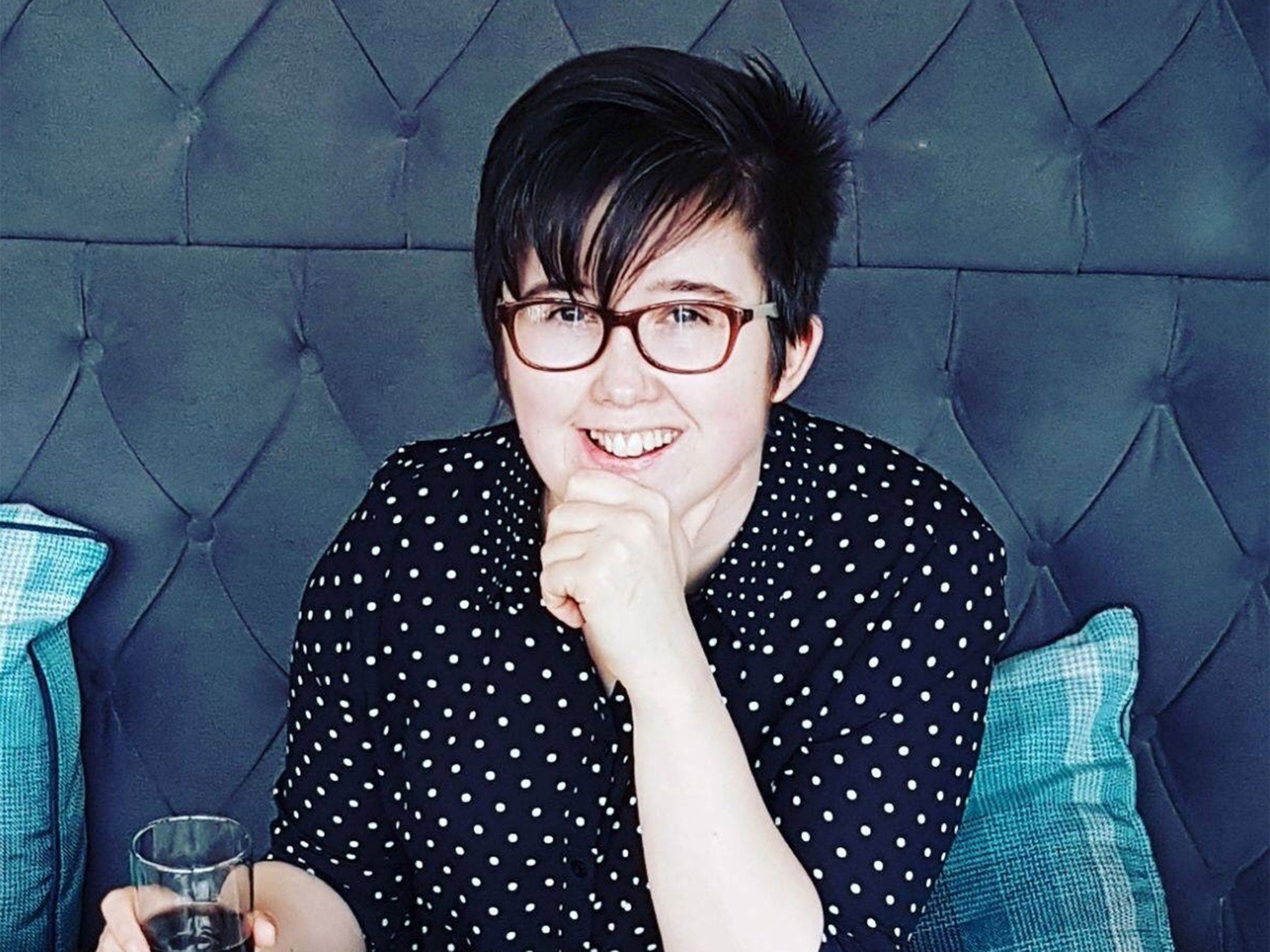Lyra McKee: ‘We will not be dragged back to the past,’ leaders vow after Northern Ireland riots
‘IRA are done’: Derry residents repaint mural amid anger and shock over murder of journalist
Your support helps us to tell the story
From reproductive rights to climate change to Big Tech, The Independent is on the ground when the story is developing. Whether it's investigating the financials of Elon Musk's pro-Trump PAC or producing our latest documentary, 'The A Word', which shines a light on the American women fighting for reproductive rights, we know how important it is to parse out the facts from the messaging.
At such a critical moment in US history, we need reporters on the ground. Your donation allows us to keep sending journalists to speak to both sides of the story.
The Independent is trusted by Americans across the entire political spectrum. And unlike many other quality news outlets, we choose not to lock Americans out of our reporting and analysis with paywalls. We believe quality journalism should be available to everyone, paid for by those who can afford it.
Your support makes all the difference.Northern Ireland will not be “dragged back to the past”, leaders have vowed after the murder of a journalist covering riots in Derry.
Investigators believe Lyra McKee was accidentally shot by a dissident republican who was aiming a handgun towards police officers, whose vehicles were petrol bombed and pelted with missiles.
The violent scenes were another unwelcome reminder of the Troubles in Derry, which has already been shaken this year by a New IRA car bombing.
Mayor John Boyle said the killing was “not done in the name of the people of this city”.
He said: “Those responsible need to understand that. The citizens of Derry, or Londonderry – it doesn’t matter what you call this city – everyone is united with one voice today to speak out.”
As vigils sprung up around Derry and Northern Ireland in memory of Ms McKee, an award-winning journalist and author who was herself a Catholic, local residents made their feelings known by defacing a mural near where she was shot.
Originally reading “IRA – Undefeated Army – Unfinished Revolution”, the wall was painted on Friday to read: “IRA are done – Defeated Army 2019 – Finished Revolution”.
Violence had broken out after the Police Service of Northern Ireland (PSNI) launched a major security operation in Creggan on Thursday evening.
Officers said they were aiming to disrupt planned violence by dissident republicans ahead of this weekend’s commemoration of the 1916 Easter Rising, and searching for guns and explosives.
But police were met by protesters who launched fireworks and bricks at their vehicles. They also hijacked cars and set them on fire before the shooting at 11pm.
Police said the New IRA were the most likely culprits, but another dissident republican group called Saoradh issued a statement claiming a “republican volunteer” had opened fire while “attempting to defend people from the PSNI/RUC”.
Deputy chief constable Stephen Martin said the instigators were “out of step” with the local community and denied police had stoked tensions.
"The police didn’t react to that disorder," he said, "We didn’t respond with any use of force, we absorbed it.”

Another senior officer said it was a “cruel twist” for violence to break out on the 21st anniversary of the Good Friday peace agreement, which was intended to foster a lasting ceasefire between republicans, unionists and security forces.
Deputy chief constable Stephen Martin urged Creggan residents to help police investigate Ms McKee’s death.
“You have to help make this madness stop,” he said. “We all want to live in peace. We all want a better future for our children, and last night’s actions are just so out of step with what all of us want.”
Ms McKee’s partner, Sara Canning, said she had lost the love of her life and “the woman I was planning to grow old with”.
“This cannot stand, Lyra’s death must not be in vain because her life was a shining light in everyone else’s life and her legacy will live on, and the life that she has left behind,” she said.
Catholic priest Father Joseph Gormley comforted Ms McKee’s family in hospital and accused the killers of forcing their viewpoint on others using the barrel of a gun.
He asked: “Have you no sense of humanity or dignity about yourself?”
Irish Taoiseach Leo Vardakar said: “Twenty-one years ago today on Good Friday, we as a people, north and south, chose peace, democracy, power-sharing and ever closer cooperation, and we will not be dragged into the past. There is no place or any justification for political violence in Ireland or Northern Ireland today.
“This was an act of fear, this was an act of hate and this was an act of cowardice. Those who carried it out do not share the views of our nation nor of our republic and we reject them.”

Northern Ireland secretary Karen Bradley said those responsible for the violence “have nothing to offer anyone in Northern Ireland”.
“Their intolerable actions are rejected by the overwhelming majority of people who want to build a peaceful and more prosperous future for everyone in Northern Ireland,” she added.
Derry, a Catholic-majority city on the border of Northern Ireland and the Republic, has long been the scene of sectarian tensions.
The Troubles are widely regarded as being triggered by a 1969 riot in the Bogside district, which was later the scene of the Bloody Sunday massacre, and the city was heavily militarised amid widespread civil unrest.
Creggan, a large housing estate on the outskirts of Derry, was temporarily controlled by the IRA and despite regeneration and peace projects, a recent report found that sectarian violence and vigilantism persists.

Join our commenting forum
Join thought-provoking conversations, follow other Independent readers and see their replies
Comments